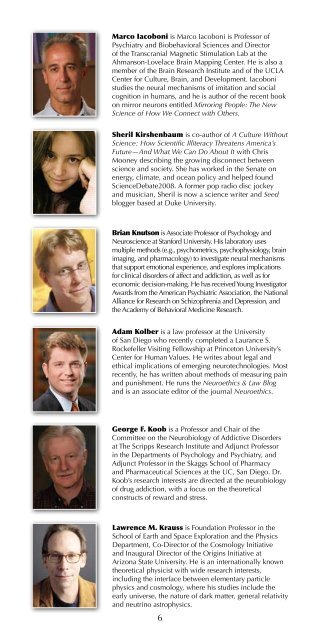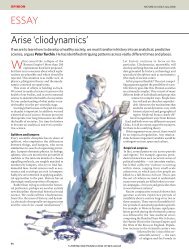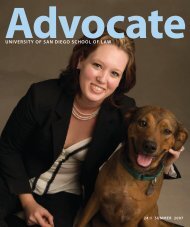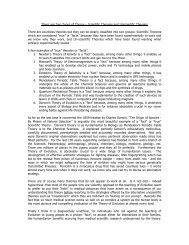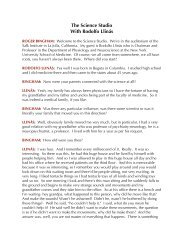BEYOND BELIEF BEYOND BELIEF - The Science Network
BEYOND BELIEF BEYOND BELIEF - The Science Network
BEYOND BELIEF BEYOND BELIEF - The Science Network
Create successful ePaper yourself
Turn your PDF publications into a flip-book with our unique Google optimized e-Paper software.
Marco Iacoboni is Marco Iacoboni is Professor of<br />
Psychiatry and Biobehavioral <strong>Science</strong>s and Director<br />
of the Transcranial Magnetic Stimulation Lab at the<br />
Ahmanson-Lovelace Brain Mapping Center. He is also a<br />
member of the Brain Research Institute and of the UCLA<br />
Center for Culture, Brain, and Development. Iacoboni<br />
studies the neural mechanisms of imitation and social<br />
cognition in humans, and he is author of the recent book<br />
on mirror neurons entitled Mirroring People: <strong>The</strong> New<br />
<strong>Science</strong> of How We Connect with Others.<br />
Sheril Kirshenbaum is co-author of A Culture Without<br />
<strong>Science</strong>: How Scientific Illiteracy Threatens America’s<br />
Future—And What We Can Do About It with Chris<br />
Mooney describing the growing disconnect between<br />
science and society. She has worked in the Senate on<br />
energy, climate, and ocean policy and helped found<br />
<strong>Science</strong>Debate2008. A former pop radio disc jockey<br />
and musician, Sheril is now a science writer and Seed<br />
blogger based at Duke University.<br />
Brian Knutson is Associate Professor of Psychology and<br />
Neuroscience at Stanford University. His laboratory uses<br />
multiple methods (e.g., psychometrics, psychophysiology, brain<br />
imaging, and pharmacology) to investigate neural mechanisms<br />
that support emotional experience, and explores implications<br />
for clinical disorders of affect and addiction, as well as for<br />
economic decision-making. He has received Young Investigator<br />
Awards from the American Psychiatric Association, the National<br />
Alliance for Research on Schizophrenia and Depression, and<br />
the Academy of Behavioral Medicine Research.<br />
Adam Kolber is a law professor at the University<br />
of San Diego who recently completed a Laurance S.<br />
Rockefeller Visiting Fellowship at Princeton University’s<br />
Center for Human Values. He writes about legal and<br />
ethical implications of emerging neurotechnologies. Most<br />
recently, he has written about methods of measuring pain<br />
and punishment. He runs the Neuroethics & Law Blog<br />
and is an associate editor of the journal Neuroethics.<br />
George F. Koob is a Professor and Chair of the<br />
Committee on the Neurobiology of Addictive Disorders<br />
at <strong>The</strong> Scripps Research Institute and Adjunct Professor<br />
in the Departments of Psychology and Psychiatry, and<br />
Adjunct Professor in the Skaggs School of Pharmacy<br />
and Pharmaceutical <strong>Science</strong>s at the UC, San Diego. Dr.<br />
Koob’s research interests are directed at the neurobiology<br />
of drug addiction, with a focus on the theoretical<br />
constructs of reward and stress.<br />
Lawrence M. Krauss is Foundation Professor in the<br />
School of Earth and Space Exploration and the Physics<br />
Department, Co-Director of the Cosmology Initiative<br />
and Inaugural Director of the Origins Initiative at<br />
Arizona State University. He is an internationally known<br />
theoretical physicist with wide research interests,<br />
including the interface between elementary particle<br />
physics and cosmology, where his studies include the<br />
early universe, the nature of dark matter, general relativity<br />
and neutrino astrophysics.<br />
6


